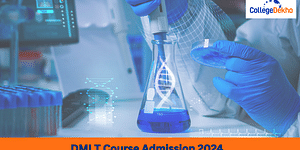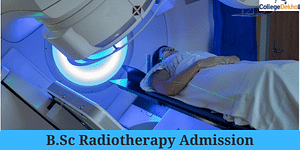BSc Radiology Syllabus & Subjects 2025
BSc Radiology Syllabus & Subjects Overview
The BSc Radiology syllabus comprises important subjects like CT Scans, MRI, Ultrasound, Anaesthesia, and Echography, among others. The primary objective of the BSc Radiology syllabus 2025 is to emphasise the scientific study of X-rays, gamma rays, and other ionising and non-ionizing radiation. Students who pursue a BSc Radiology course get an in-depth idea of the industry-oriented knowledge and a hands-on experience with current radiology practices.
The BSc Radiology subjects have been divided into six semesters for the 3-year course duration. There are two subspecialties in this course, namely, diagnostic radiology and interventional radiology. Both subjects are elaborated in the BSc Radiology syllabus semester wise chapters for a detailed understanding. Students can opt for a wide range of career options after pursuing a Radiology course, including Radiology Technician, Radiologist, and MRI Technician.
Table of Contents
- BSc Radiology Syllabus & Subjects Overview
- BSc Radiology Year Wise Syllabus
- BSc Radiography Syllabus Semester wise
- BSc Radiology Core Syllabus & Subjects
- BSc Radiology Elective Syllabus & Subjects
- BSc Radiology Practical Subjects
- BSc Radiology Entrance Exam Syllabus
- BSc Radiology Important Books
- BSc Radiology Course Structure
- Teaching Methodology and Techniques for BSc Radiology
- BSc Radiology Assignments/Projects
- FAQs about B.Sc Radiology Syllabus
BSc Radiology Year Wise Syllabus
The BSc Radiology subjects include core subjects and elective subjects. The same also features some elective subjects divided into a semester structure. The following are some of the detailed BSc Radiology subjects 1st year, 2nd year and 3rd year offered in almost all colleges and universities:
| First Year BSc Radiology Subjects (Semester 1 & 2) | |
|---|---|
| Anatomy of Human | Basic Physics |
| Diagnostic Radiology and Physics | Radiography Apparatus |
| Pathology and Physiology | Nuclear Physics |
| Second Year BSc Radiology Subjects (Semester 3 & 4) | |
| Ethics and Patient Care | Processing Techniques for Images |
| Radiography for Medical Use | The Principles of Emergencies |
| Process of Contrast Radiography | CT scan, MRI, and Ultrasound |
| Organizational Conduct | Work on Projects |
| Third Year BSc Radiology Subjects (Semester 5 & 6) | |
| Advanced Imaging Modality Instruments | Auditing a Log Book |
| Radiation and Radiobiology | Echography and Doppler |
| Quality Assurance | The Use of Anaesthesia in Diagnostic Radiology |
| Imaging Techniques Other Than X-Ray | Interventional Radiology Procedures |
BSc Radiography Syllabus Semester wise
The syllabus for BSc Radiography is centred on the different methods of producing radiation images of the bones, organs, tissues, and blood vessels in the body. Subjects in BSc Radiology may vary. The following is the BSc Radiology semester-by-semester syllabus:
| BSc Radiography Subjects Semester 1 | |
|---|---|
| Regional Language | Anatomy |
| English | General Physics |
| Microbiology & Pathology | -- |
| BSc Radiography Subjects Semester 2 | |
| Regional Language | Physiology |
| English | Biochemistry & Pharmacology |
| Conventional Radiology | -- |
| BSc Radiography Subjects Semester 3 | |
| Darkroom Technique | Special Radiography Procedures |
| General Radiology | Radiation Detection, Measurement, and Protection |
| Radiological Physics | -- |
| BSc Radiography Subjects Semester 4 | |
| Computed Tomography | Radiographic Photography |
| Physic of Imaging Equipment’s | Radiographic Positioning & Image Processing Technique |
| Quality Control in Radiology and Radiation Safety | -- |
| BSc Radiography Subjects Semester 5 | |
| Magnetic Resonance Imaging | Modern Imaging Technology |
| Radiotherapy | Elective |
| BSc Radiography Subjects Semester 6 | |
| Interventional Imaging Technology & Ultrasonography | Elective |
| Medical Radiography | Project |
BSc Radiology Core Syllabus & Subjects
BSc Radiography courses impart both theoretical and practical knowledge of modern and traditional radiography techniques, including computed tomography and fluoroscopy. The list of the BSc Radiology core subjects are as follows:
| BSc Radiography Core Subjects | |
|---|---|
| Radiography | Fluoroscopy |
| Special Radiography | Modern Imaging Systems |
| Nuclear Medicine | Production of X-rays |
| Interaction of Radiation with Matter | - |
BSc Radiology Elective Syllabus & Subjects
Find out the BSc Radiology elective subjects below:
| BSc Radiography Elective Subjects | |
|---|---|
| Radiographic special procedures | Ultrasonography & Doppler Imaging |
| Medical Biotics & IPR | CR, DR, and PACS |
| Psychology | CT Scan |
| Advanced and Modern Imaging | - |
BSc Radiology Practical Subjects
The list of the BSc Radiology practical subjects have been provided below for all interested students:
BSc Radiology Subjects 1st Year | |
|---|---|
| Demonstration of tissues of the body | Demonstration of parts of the respiratory system |
| Study various body fluids | Determination of Blood Groups |
BSc Radiology Subjects 2nd Year | |
| Core General Radiology | Core Radiation Physics |
| Check light leakage in the cassette | Demonstration of reflex action |
| Demonstration of various parts of the nervous system | - |
BSc Radiology Subjects 3rd Year | |
| Prepare a characteristic curve of a Radiography film | Check the effect of safe light on exposed as well as unexposed X-RAY film |
| Clinical Examination of Arterial Pulse | Determination of Vital Capacity |
BSc Radiology Entrance Exam Syllabus
For the purpose of granting admission to students for radiology courses, entrance exams are held. To be admitted, students must study for these exams and perform well on them. The administration of entrance exams may take place at the federal, state, or even college level. These are a few of the more well-known exams given for the radiology course:
- AIIMS institute conducts the All India Institute of Medical Sciences Radiography Entrance. It is one of our country's top medical science institutes
- Students can take the Jawaharlal Nehru Institute of Postgraduate Medical Education Research Radiography Entrance Exam - Radiology here. Those who want to take the course must take the exam
- The Delhi University Post Graduate Medical Entrance Test - Delhi University administers Radiology exams. Students who wish to enroll in a college course must take the exam
- Vinayaka Missions University All India Common Entrance Exam - Vinayaka Missions University administers this exam. It is a national-level exam that is used to grant admission to various programmes
- The National Institute of Mental Health and Neuro Sciences Radiography Entrance Exam - This is a college-specific exam. Those who wish to study radiology at this college should take the exam
BSc Radiology Syllabus for the entrance examination will include questions from the CBSE class 10+2 syllabus. Students will be asked questions from the following sources:
- Biology
- Chemistry
- Physics
The BSc Radiology entrance exam will last three hours and award a maximum of 100 points. Correct answers will receive full marks, while incorrect answers will receive one mark deducted.
BSc Radiology Important Books
Some of the best book for studying the BSc Radiology Syllabus 2025 have been mentioned in the table below for your reference. The authors transmit their knowledge and methods for teaching to succeeding generations of learners.
| Book Title | Author’s Title |
|---|---|
| Unofficial Guide to Radiology: 100 Practice Abdominal X-Rays | Daniel Weinberg |
| Grainger & Allison’s Diagnostic Radiology: The Spine | Jonathan H Gillard |
| Musculoskeletal Imaging (Expert Radiology) | Thomas Pope |
| Diagnostic Radiology, 3-Volume Set: A Textbook of Medical Imaging: An Anglo-American Textbook of Imaging | Ronald G. Grainger MB ChB |
| Textbook Of Radiology Physics | Singh Hariqbal |
BSc Radiology Course Structure
The BSc Radiology course structure is an amalgamation that develops over the course of three years and assembles all six semesters of the BSc Radiology course subjects.
The following are the course requirements:
- 6th semester
- Core subjects and electives
- Internship
- Project/Assignment Submission
Teaching Methodology and Techniques for BSc Radiology
BSc Radiology includes a variety of instructional strategies. In contrast to conventional teaching strategies, aspirants are instructed to complete practical work in reputable labs. Aspirants are also trained in accordance with their qualifications and needs.
The teaching methods and techniques are listed below:
- Collaborative
- Experimental Design: Process-based & Problem-based
- Lecturing
- Using concept maps
- Discussion
- Reading
- Hands-on Exercises
BSc Radiology Assignments/Projects
The projects for the BSc in Radiology are extremely sophisticated and difficult. Therefore, candidates form teams of two to four people to divide up the assigned project task equally among all of them within a set amount of time. The aspirants' ability to work independently is enhanced by this process, which also helps them gain experience.
The BSc Radiology course subjects projects are listed below:
- The findings in hypertensive patients' echocardiograms at Conquest Medical Imaging Center in Enugu
- Analyzing the degree to which standard Posteroanterior chest Techniques are being followed
- figuring out what influences radiographers' adherence to their professional body
- Battery-powered dual face radiographic viewing box made by hand
- Public awareness of the health effects of telecommunications radiation
FAQs about B.Sc Radiology Syllabus
Which group is easy in BSc Radiology?
Is BSc Radiology good for the future?
How many papers are there in BSc Radiology?
What if I fail in BSc Radiology?
What percentage is good in BSc Radiology?
What is the total marks in BSc Radiology?
Is BSc Radiology first year Tough?
What are the subjects in BSc Radiology 1st year?
What are the entrance examinations required for BSc Radiology admission?
Is Mathematics necessary at 12th class for BSc Radiology admission?
What is the average placement package for BSc Radiology?
Is there a summer internship for this BSc Radiology program?
What is the average course fee for this BSc Radiology program?
What are the best colleges for BSc Radiology?
Popular Courses
- Courses
- B.Sc Radiology
- Syllabus & Subjects










